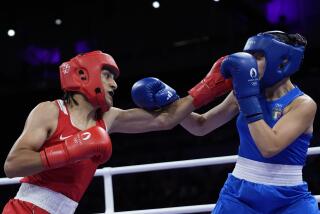Boxing’s sanctioning bodies on board with California’s push for weight-cutting, dehydration measures
- Share via
A summit of all major boxing sanctioning bodies Wednesday in Los Angeles led to the consensus to incorporate fight-day weigh-ins to better address the sport’s dangers of weight cutting, extreme dehydration and rapid rehydration.
“It’s the hurt sport. There’s going to be some injuries, but we don’t need to turn a blind eye to it when we know it can be safer,” said Dr. Paul Wallace, a longtime ringside physician.
California State Athletic Commission Executive Officer Andy Foster summoned World Boxing Council President Mauricio Sulaiman, World Boxing Organization head Francisco “Paco” Valcarcel and International Boxing Federation President Darryl Peoples among others for the session.
Foster pointed to a commission study of 754 boxers that found 164 inflated more than 10 percent beyond their official day-before weigh-in figure.
That shows not only the significance of the original weight cut, but the concern that the cut followed by sharp rehydrating leaves the body susceptible to a slew of problems, including heart, kidney and brain issues, along with kidney weakness, drowsiness and decreased vision and alertness.
“We see people lose 20 to 25 percent of their weight, regain it and fight in a championship fight,” Wallace warned. “No rational person can say that’s OK.”
The commission heads agreed to begin fight-day weigh-ins as soon as possible and share the data with the Assn. of Boxing Commissions and the California commission for further discussion on the matter.
The officials agreed gaining more than 10 percent of weight back before a fight is a hazardous rise, and Foster suggested in the meeting that he’d like new standards in place by January 2020.
“I want to see all the numbers and then with this data, we’ll follow up and see where to go,” Foster said. “This is about boxing, not California.”
The IBF already has a system in place to strip champions of their belt or bar challengers from winning a title fight if their fight-day weigh-in figure is 10 pounds over for those fighting at 140 pounds or less, or 7½ pounds over for those fighting at 147 and heavier weights.
Last year, middleweight challenger Daniel Jacobs overinflated and was denied fighting for the IBF belt against then-three-belt champion Gennady Golovkin.
Manager Frank Espinoza urged the group to adopt the second-day weigh-ins after his featherweight champion Oscar Valdez allowed overweight challenger Scott Quigg to fight earlier this year, then suffered a fractured jaw on a punch from the far bigger challenger while defeating Quigg.
“Is it cheating?” to inflate in weight far beyond a division’s weight limit, Foster asked. “The spirit of the rules are being violated. It’s a tactic that is used, and it doesn’t have to be this way. There’s been inaction over the years. This has been brewing.”
The study found that a Golden Boy Promotions featherweight fighter weighed a staggering 149.6 pounds on a Feb. 22 card, gaining 23.4 pounds following the official day-before weigh-in.
“The sanctioning bodies have an opportunity to do something about this,” said Foster, who described mixed martial arts weight issues as worse. “This is a one-shot deal. We have one shot to fix this today. I implore you guys to act on this.”
The sanctioning bodies agreed that intravenous rehydration practices should be banned, while acknowledging a debate is required to establish what time a fight-day weigh-in would occur. Foster said he prefers doing it when the fighters arrive at the venue.
Showtime President Stephen Espinoza addressed what one official referred to as “the elephant in the room” by noting the potential backlash it would cause by scrapping a fight based on a weigh-in just a few hours before a bout.
“I applaud you for being proactive,” Espinoza said. “As a TV executive, that [last-hour cancellation] is a nightmare. As a fan-experience issue, you’ll have people who have spent money to watch or who’ve flown in for a fight. I don’t want the backlash of losing fans.”
Foster answered “we can’t be talking about killing fights,” but urged the sanctioning bodies to deprive violating boxers of a possible 10 percent rehydration limit from winning a belt.
Others pushed for all trainers and fighters to receive improved education about proper, healthful weight loss, with the mission to have fighters slotted in weight divisions as close to their natural weight as possible.
“There is a natural resistance to change, but the WBC will abide 100 percent and work on whatever needs to be done to improve fighter safety,” Sulaiman said. “There has to be a step-by-step plan with specific actions for all of us to follow.”
More to Read
Go beyond the scoreboard
Get the latest on L.A.'s teams in the daily Sports Report newsletter.
You may occasionally receive promotional content from the Los Angeles Times.











